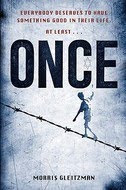Gleitzman, Morris. Once. New York: Henry Holt and Company, 2010. Print.
[Book cover credit: librarything.com/work/820104]
Awards:
KOALA, Fiction for years 7-9 (2007)
YABBA, Fiction years 7-9 (2007)
CBCA Honor Book, Younger Readers (2006)
Booktalk:
Once there was a boy named Felix who lived at an orphanage in Poland, only he wasn't an orphan. Almost four years ago Felix's secret alive parents left him with Mother Minka, at the orphanage, so they could travel and find out why their bookstore had to close.
Once Nazis came to the orphanage and burned all the Jewish books in the library. Then Felix knew the answer to his parents' problem. See, Felix not only has secret alive parents, he's also secretly Jewish. Maybe if his parents sold more books that the Nazis liked, their bookstore wouldn't have to close.
Armed with this revelation, Felix leaves the orphanage to find his parents. Instead of them helping and protecting him, maybe Felix can save them, just this Once.
Review:
Doesn't the whole premise of this book stress you out? It stressed me out. For a book of 163 pages* I had to put it down more than a couple of times because I was just too nervous for Felix. He was so young when his parents left him at the orphanage. This is, presumably, why they didn't tell him why they were really leaving him in the hands of a bunch of nuns, and the nuns certainly didn't tell him either. How could they? How could they explain that to 6 year old Felix when he entered the orphanage? Besides, if Felix didn't pray to God, Jesus, the Virgin Mary, the Pope and Adolf Hitler like the rest of the orphans, he'd stand out.
It was heartbreaking to watch Felix do things like return to his family's home in what used to be a Jewish neighborhood, try to flag down a truckload of soldiers when he needs help, or pray to Adolf Hitler to keep him safe, as he's been taught to do. He really has no idea what is going on in Poland and the rest of Europe. He has no idea that at ten years old he is a hunted man. His realization that it is not Jewish books that the Nazis hate, but Jews themselves, is painfully slow, and yet I never once doubted the authenticity of Felix's thought processes and take on the situation around him. As Felix's naivety lessens to make room for the huge weight of his new knowledge, it is sometimes hard to believe that he is only ten, or even that he is the same boy that I met at the beginning of the book. This is not to say that Felix's voice lost any of its authenticity, he is just aged so much by what he has to go through.
Even given the subject matter, and the violence does get a bit graphic by the end, this is a beautiful book. The stories that Felix makes up for himself and others to get them through the really hard times, the people that help Felix along the way, and the hope and compassion that Felix just never loses make this an (almost) uplifting story. The ending is not horrific or magically happy. It has that Living Dead Girl or The Giver factor (Does he make it to a better place or to a "better place"?) that is a bit open to interpretation. ETA: Except that it isn't. The sequel, Then, is available in the UK and will hopefully be available in the US soon.
Once will be available for purchase in the US on March 30th, next Tuesday!
Book source: Review copy from publisher, via the yalsa-bk listserv.
*This page count is from an uncorrected proof and may not match the published copy.

1 comment:
Such terrible and horrific circumstances but such a brave and determined little boy. Good review.
Post a Comment